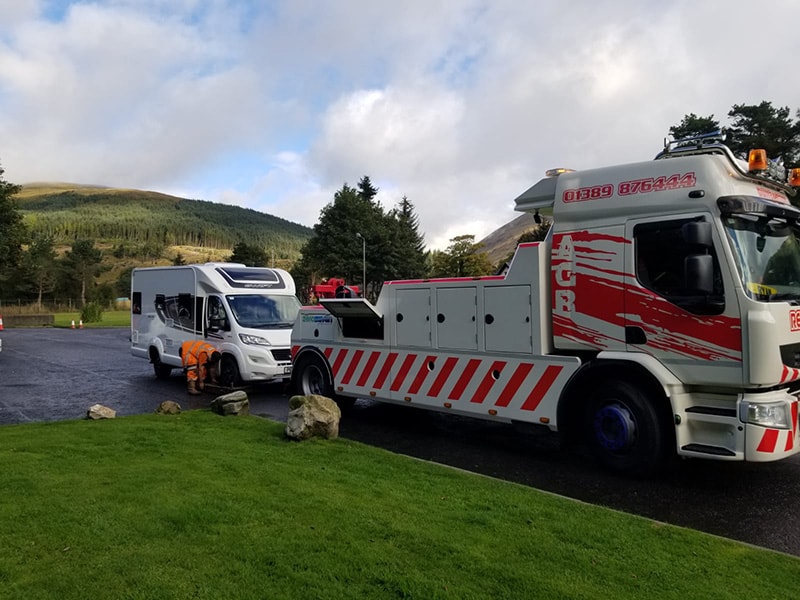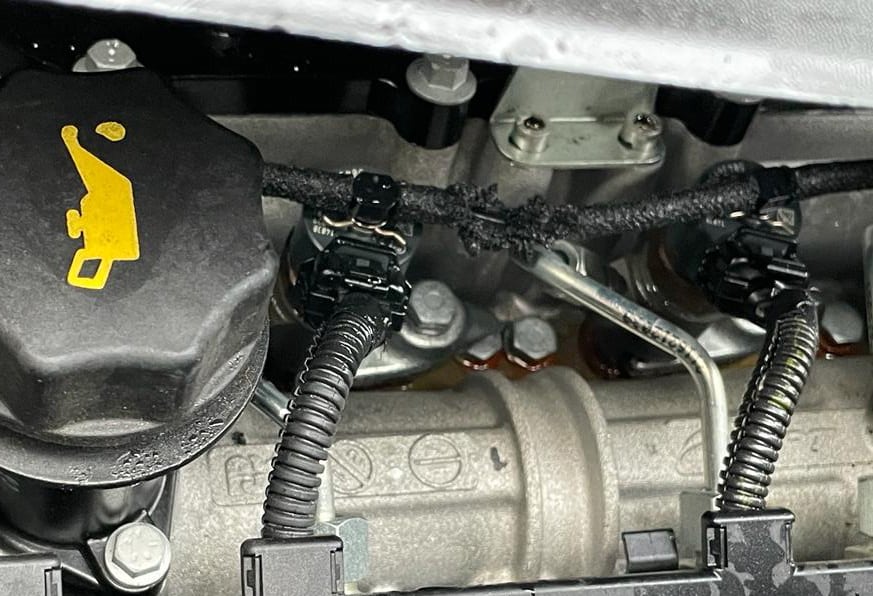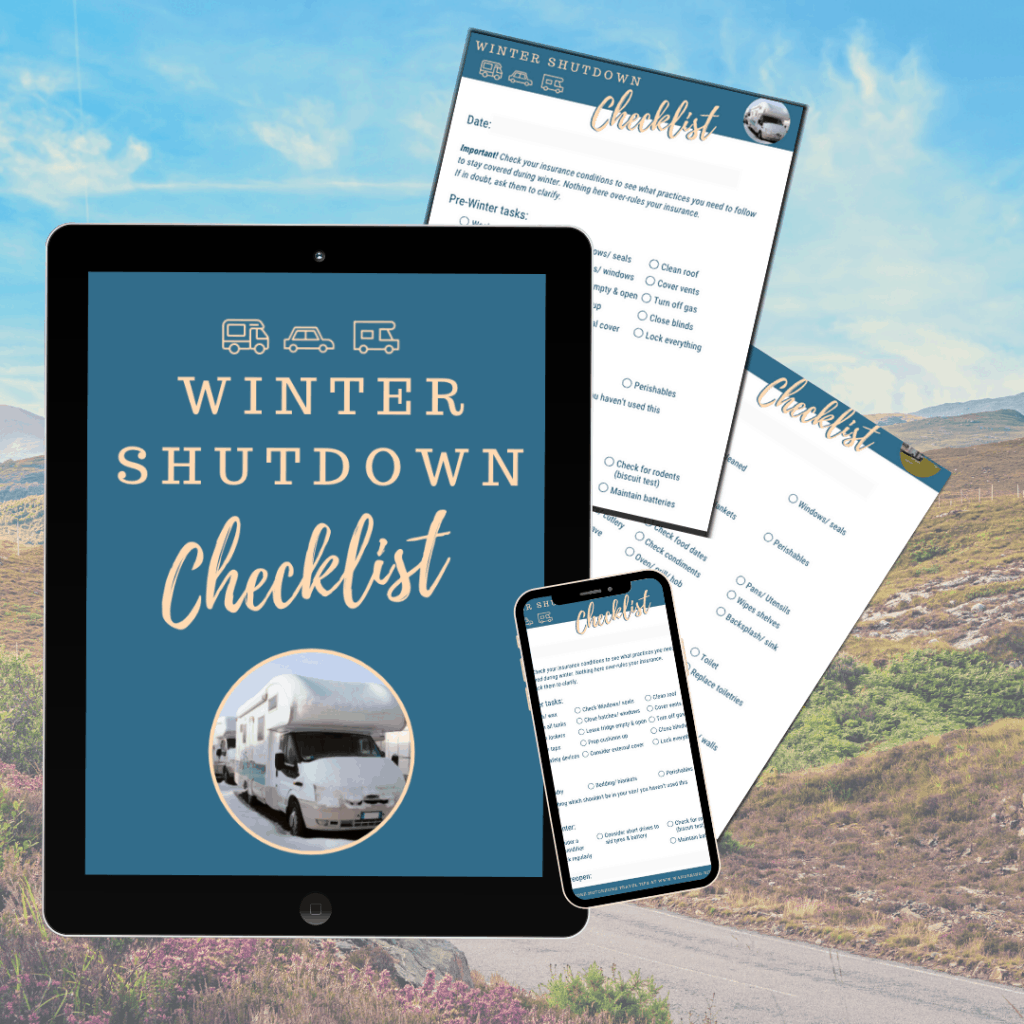Did you know that mice, rats, squirrels, and other rodents can cause HUGE damage to your motorhome, RV or camper? In fact, just recently a friend of mine had her trip RUINED because a mouse chewed her fuel line.
To help you avoid the same problem, we’ve put together this guide on the BEST mouse deterrent for campers to protect your van from rodents, and other tips and home remedies you might want to try too.
Don’t forget to grab your FREE motorhome maintenance checklist below to make sure you get all your checks done.
*We work hard to make this the best motorhome travel blog and road trip website possible, full of helpful content for you. The website is supported by our readers, so if you buy through links on this site we may earn a commission- at no extra cost to you. All opinions remain our own.
If you find this post useful, you can also treat us to a coffee – we promise to enjoy it while creating more useful content like this- we might even indulge in a biscuit (or two!)
Mice in Your Motorhome – The Problem
Until you’ve discovered a mouse in your motorhome or campervan, it’s difficult to explain the damage they can do.
We found mice in our motorhome a couple of years ago, after we’d been wild camping in Scotland. They had eaten into ALL the dried food (including the dog food) and had destroyed my folding yoga mat to make a nest under the fridge.
To say it was a mess is an understatement.
The Damage That a Mouse Can Do to Your Motorhome
However, it turns out we got away lightly.
Back in 2023, I met a friend of mine called Leah up in Scotland and we were planning a route around the North Coast 500 with our motorhomes.
We got barely an hour north of Edinburgh, and she said she could smell diesel. When we stopped, diesel was POURING out… and we discovered that a mouse had chewed through her hose.

Sadly, this meant she had to be towed back and missed out on the entire trip. 🙁
We want to help you avoid this trauma.
We’ve rounded up the best deterrents to keep mice, rats, squirrels, snakes and other rodents out of your motorhome, campervan, caravan or RV, plus some natural or home remedies which you can pick up from anywhere.
Watch the Damage Mice Can Do to Your Motorhome or Camper
If you’d like to see the video of our Scotland tour, including discovering the mouse damage, here you go:
We hope you found the video useful. If you did, we’d love it if you followed us on Youtube. New videos with tips for motorhoming and campervanning in the UK and Europe are released weekly.
How Do Mice and Other Pests Get into Your Van?
As the temperatures drop, the animals start looking for somewhere warm to make their nests… and your van is the PERFECT place (especially if there’s food stored inside too.)
So be ESPECIALLY careful if you’re motorhoming in winter or planning a UK winter road trip– you’re more likely to attract unwanted guests!
Mice have two top skills- they’re small and they’re great at climbing. This means they can and will find entry points into your camper, even if you think it’s too high off the ground for them.
They can enter by ducts, external vents, holes in roofs, floors or walls, tubes, aerial holes and the most common option is they climb the tyre into the engine bay.

Other pests and insects can get entry via:
- Really tiny openings between panels or outside (such as where pipes pass through)
- Cracks in the floor or ventilation holes
- Through doors, windows or hatches left ajar
How Do You Know if You’ve Got Mice or Pests in Your Motorhome?
The Biscuit test!
If you’re shutting down your van for the winter, and want to know if any unwelcome ‘guests’ have moved in (I don’t mean the in-laws!), then put a piece of biscuit on the floor of your van when you leave it.
If it’s still there when you come back, you can be reasonably sure you’re safe from pests and rodents in your van.
If it’s not… ?

Shutting down your motorhome/ camper for winter?
Grab your FREE winter shutdown checklist here
How to keep mice out of camper during storage or parking?
The easiest way to avoid damage to your camper from mice or rodents is to not let them in in the first place.
You can do this by:
- sealing all points of entry (although you’ll still need some for ventilation)
- using rodent scarers and deterrents
- not storing food in your van, especially in lower lockers
- keeping your camper clean inside
- Not storing food or leaving rubbish bags outside your van to take to the bin in the morning!
How do I keep mice or insects out of my RV camper in the winter or in storage?
Most unwanted pest ‘invasions’ happen over winter or when your van isn’t being used often.
It doesn’t always have to be in storage. Leah’s van was damaged after she wild camped next to a loch in Scotland!
But the majority of rodents find a way into vehicles which aren’t being used a lot. To help stop this, you can fit things like exterior vent covers, seal up filling points and even putting a cover on your van can help.
How do you keep mice from climbing into your van?
It always surprises me just how HIGH these critters can jump and climb. Tyres, standing, awnings- you name it, they’ll climb it.
If you want to stop mice from climbing up your tyres, you can wrap rings of sheet metal around your tyres, jack stands or anything else you don’t want mice to climb up! Make the rings about a foot tall and no mouse will be able to scale it.
What is the Best Mouse Deterrents for Campers and Motorhomes?
There are several things you can do to deter mice from choosing your van. The main options are:
- Sprays with essential oils (like Peppermint)
- Ultrasonic Pest Repellents (Battery, plug-in or 12v versions)
- Humane traps
Home remedies and sprays with Essential oils
Peppermint oil is the most common form of rodent deterrent we’ve heard of, and is the best natural remedy too.
Mice apparently hate the smell of peppermint, so they won’t go near the van.
Lavender and eucalyptus has also been known to have a similar effect.
How to Use Peppermint Oil to Repel Mice
The most important things is the strength of the mix- the stronger the smell, the more poor Mr Mouse doesn’t like it.
However, with essential oils, you need to consider
- Your health conditions
- Pets you have
Some people can react badly to essential oils, so use a little to start with and build up. Also, make sure you put them somewhere a pet can’t drink or chew them. ]
To use Oil with cotton balls to repel mice in your van
Soak cotton balls in peppermint oil and put all around your motorhome or RV. If you put them in a jar, make sure the lid xis off.
Of course, you’ll need to replenish and replace the oil/ cotton wool fairly regularly.
To use oil with spray- for external use
In a 400ml spray bottle, add the peppermint oil drops and water. Make this as potent as you wish. You can add approx. 10-15 drops to 400ml for a strong mix. Shake well to mix together.
Spray onto around the parameter of your van on the ground outside. This will create a scent barrier that the mice will not want to cross. Do this once a week or after heavy rain.
But if you spray around your van underneath, this should help with not having it dilute/wash away with rain.
Use the Oils and Spray for Internal use
Create a weaker spray (use 3-5 drops of peppermint oil per 400ml). You don’t want it too strong, especially if you’re travelling with dogs.
Spray this onto areas where there is an inlet or hole into the van.
CAUTION: Don’t spray onto anything where there is going to be direct heat- this spray is oil based and flammable!
If your van is going into storage for winter, you could probably make a stronger mix of the internal spray and leave it there whilst you’re not using your van.
Does Peppermint Spray Really Keep Mice Away?
Apparently so! Many people have used this spray with success- so it’s worth trying.
Best mouse deterrent for campers- pre-made sprays
If you don’t want to make your own, you can buy pre-made sprays
Ultrasonic 240v pest repellents
These are widely sold, but have very mixed reviews and they’re not the best solution to keep mice away from motorhomes or RVs.
For a start, they require power, which will be a constant drain on your motorhome leisure battery.
Next, they don’t work instantly, but work over time, by emitting different frequencies of ultrasonic waves to irritate the nervous system of insects and rats. This makes the pests feel uncomfortable so they move away.
Intermittent changes in ultrasound frequency prevent them from developing immunity and adaptability.
They’re supposed to be imperceptible to humans, but many people have reported feeling headaches or hearing high-frequency noise.
They can be used outside or inside (depending on the model), so can be fitted into engine bays or under the van.
12v or Battery Operated Rodent Scarers
It’s also possible to buy 12v or battery-powered versions of these rodent scarers. These can be easier to fit, but you need to remember to change the batteries or that there will still be a drain on your battery.
Personally, we used these in a garage a few years ago and didn’t have great success, but feel free to try and see if they work for you. This is the highest rated one on Amazon.
Note: These are designed for effectiveness over a extended period of time and are NOT an instant fix.
Mothball Type
Another scent mice don’t like is mothballs, so considering putting some of these around your van.
Other scents rodents don’t like include; vinegar, clove oil and cayenne pepper.
Do dryer sheets keep mice out of camper?
Apparently so! In the UK, we don’t use dryer sheets as much as they do in America, but many people have suggested them as a great solution to repel mice in your RV or motorhome. Again, you’ll need to replace regularly to maintain effectiveness.
Humane Traps
If you have an existing problem with mice or rodents in your van, you might want to use a humane trap to catch them.
Lastly- the BEST Mouse Deterrent for Campers, Motorhomes and RVs…?
Get a cat.
I have never ever heard of a motorhome or RV owner who travels with a cat who have a cat who has a problem with mice in their van. Co-incedence? I think not…
Many thanks to Leah for her photos and tips when writing this post. Follow her on Instagram
Want more tips for motorhoming?
Here are some more ideas you might find useful:
Want FREE checklists, eBooks and additional tips to help? Visit our resource page

Last update on 2024-08-09 / Affiliate links / Images from Amazon Product Advertising API
